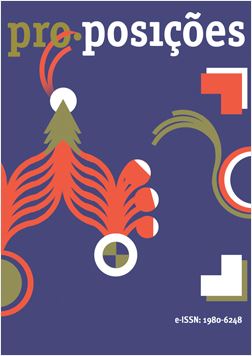Resumen
Vygotsky’s article about the psychology of the actor is a good example of continuities and connections between the early and late work of this psychologist and theater critic. Contrary to a divide between an “instrumental”, “mechanistic” and “reductionist” phase before 1930 and later a “holistic” phase (Yasnitsky, van der Veer, 2016, p. 92), the discourse about the actor and Diderot’s notion of “artificial feelings” (sensibilité artificielle) proves Vygotsky’s ongoing commitment regarding questions of experience (perezhivanie), catharsis and the status of emotions. The dichotomy of the actor’s emotions as shown by Diderot in Paradox of Acting is a key for Vygotsky to insist on the historicity of emotions and a transformation of psychology’s methods. As part of the creative work, the actor’s emotions are divided with opposing forces. In Vygotsky’s Psychology of Art, the formalist term for such a division is dvoistvennost’ (twofoldness). Only by overcoming naturalist assumptions and by placing emotions in the context of other mental functions, psychology with indirect methods would be capable of dealing with this historicity. This is a “psychology in terms of drama”, as suggested in “Concrete Psychology”. My paper will focus on the connections between early reviews, “The Psychology of Art” (1925), “Concrete Human Psychology” (1929) and “The Psychology of the Actor’s Creative Work” (1932).
Citas
Brodsky, C. (2014). “The Real Horizon” (beyond Emotions): What Proust (Wordsworth, Rousseau, Diderot, and Hegel) Had “in” Mind. Rethinking Emotion: Interiority and Exteriority in Premodern, Modern, and Contemporary Thought Ed. by R. Campe and J. Weber. Berlin: De Gruyter. https://doi.org/10.1515/9783110259254
Dafermos, M. (2021). The metaphysics of psychology and a dialectic perspective. Theory & Psychology, 31(3), 355-374
Diderot, D. (1883). The Paradox of Acting Transl. by W. H. Pollock. With a preface by H. Irving. London: Chatto & Windus.
Gurevich, L. Ya. (1927). Tvorchestvo aktera. O prirode chudozhestvennych perezhivanii aktera na scene Moskva: GAChN.
Hansen-Löve, A. A. (2001): Russkij formalism: Metodologicheskaia rekonstrukciia razvitiia na osnove principa ostraneniia Moskva: Yazyki russkoi kul’tury (first published in German, 1978).
Kloetzer, L. (2020). Concrete Psychology and the Activity Clinic Approach: Implications for Interventionist Research in the XXIst Century. Kulʹturno-Istoricheskaia Psikhologiia, 16(2), 42-50. https://doi.org/10.17759/chp.2020160206
Larrain, A., & Haye, A. (2020). The dialogical and political nature of emotions: A reading of Vygotsky’s The Psychology of Art Theory & Psychology, 30(6), 800-812. https://doi.org/10.1177/0959354320955235
Mareev, S. N. (2017). L. S. Vygotsky. Filosofija, psichologija, iskusstvo Moskva: Akadem. proekt.
Menke, C. (2021): The paradox of capacity and the power of beauty. Critical Theory and New Materialisms Ed. by H. Rosa, C. Henning, A. Bueno. New York: Routledge, 95-106.
Politzer, G. (1994). Critique of the Foundations of Psychology: The Psychology of Psychoanalysis Translated by M. Apprey. Pittburgh: Duquesne University Press.
Shklovsky, V. (2017). Bowstring: On the Dissimilarity of the Similar Translated by S. Avagyan. Champaign, IL: Dalkey Archive.
Sobkin, V. S. (2016). Zametki po povodu teatral’nych recenzii L.S. Vygotskogo. Kul’turno-istoricheskaia psichologiia, 12(4), 26-38. https://doi.org/10.17759/chp.2016120403
van der Veer, R. & Valsiner, J. (1991). Understanding Vygotsky. A Quest for Synthesis Oxford/Cambridge: Blackwell.
Vassilieva, J., & Zavershneva, E. (2020). Vygotsky’s “Height Psychology”: Reenvisioning General Psychology in Dialogue With the Humanities and the Arts. Review of General Psychology, 24(1), 18-30. https://doi.org/10.1177/1089268020902723
Veresov, N. (2017). The Concept of Perezhivanie in Cultural-Historical Theory: Content and Contexts. Perezhivanie, Emotions and Subjectivity Ed. by M. Fleer, F. González Rey, N. Veresov. Singapore: Springer https://doi.org/10.1007/978-981-10-4534-9_3
Vigotski, L. S. (2023). Sobre a questão da psicologia da criação pelo ator. (P.N. Marques, Trad.). Pro-Posições, 34, ed0020210085. http://dx.doi.org/10.1590/1980-6248-2021-0085 (Original work published 1936).
Vygotskij, L. S., Zavershneva, E., & Veer, R. (2018). Vygotsky’s Notebooks: A Selection Singapore: Springer https://doi.org/10.1007/978-981-10-4625-4
Vygotsky, L. S. (2015a). K voprosu o psichologii tvorchestva aktera. Polnoe sobranie sochinenii V 16 t. T. 1. Dramaturgiya i teatr. Sost., red., vstup. st., komm., prim. V. S. Sobkin. Moskva: Lev, 437-445 [Engl. transl. Vygotsky, L. S. (1999). On the problem of the actor’s creative work. In L. S. Vygotsky, The collected works Vol. 6. Scientific Legacy. Springer, 237–244].
Vygotsky, L. S. (2015b). Chorosho shitii frak. Polnoe sobranie sochinenii V 16 t. T. 1. Dramaturgiya i teatr. Sost., red., vstup. st., komm., prim. V. S. Sobkin. Moskva: Lev, 349-350.
Vygotsky, L. S. (2005). Konkretnaia psichologiia cheloveka. Psichologiia razvitiia cheloveka Moskva: Smysl, 1020-1038.
Vygotsky, L. S. (2001). Analiz esteticheskoi reakcii Moskva: Labirint.
Wolfe, C. T. (2016). Materialism and “the soft substance of the brain”: Diderot and plasticity. British Journal for the History of Philosophy, 24(5), 963-982. https://doi.org/10.1080/09608788.2016.1169989
Yasnitsky, A. & van der Veer, R. (2016). Vygotsky the published: who wrote Vygotsky and what Vygotsky actually wrote. Revisionist revolution in Vygotsky studies Edited by Anton Yasnitsky and René van der Veer. London, New York: Routledge, 73-93.
Yaroshevsky, M. G. (2013). L. S. Vygotsky. V poiskach novoi psichologii Izd. 3-e. Moskva: Librokom.
Zavershneva, E. I. (2010). “The Way to Freedom”: On the Publication of Documents from the Family Archive of Lev Vygotsky. Journal of Russian and East European Psychology, 48(1), 61-90. https://doi.org/10.2753/RPO1061-0405480103

Esta obra está bajo una licencia internacional Creative Commons Atribución-NoComercial 4.0.
Derechos de autor 2023 Pro-Posições


